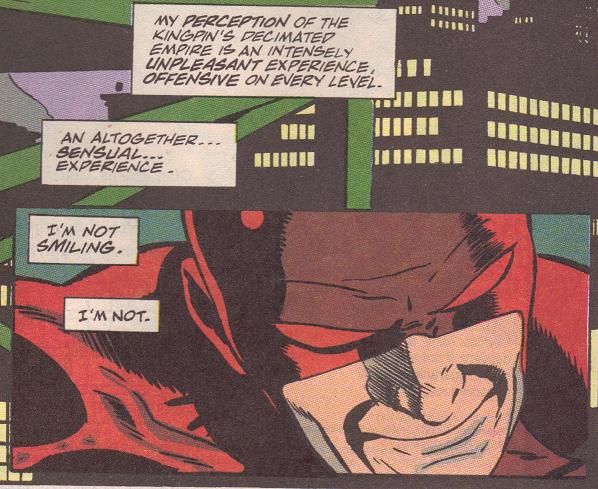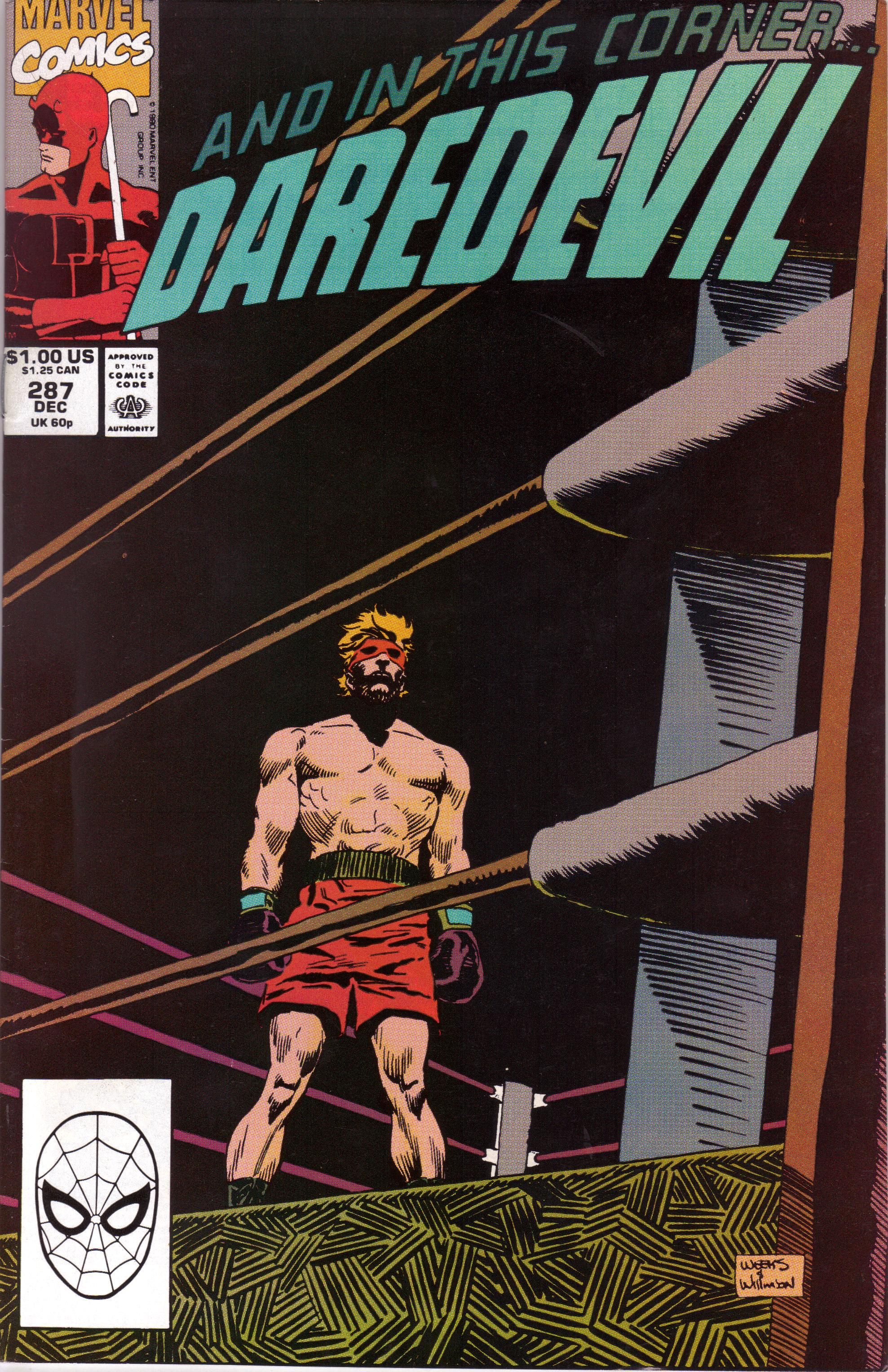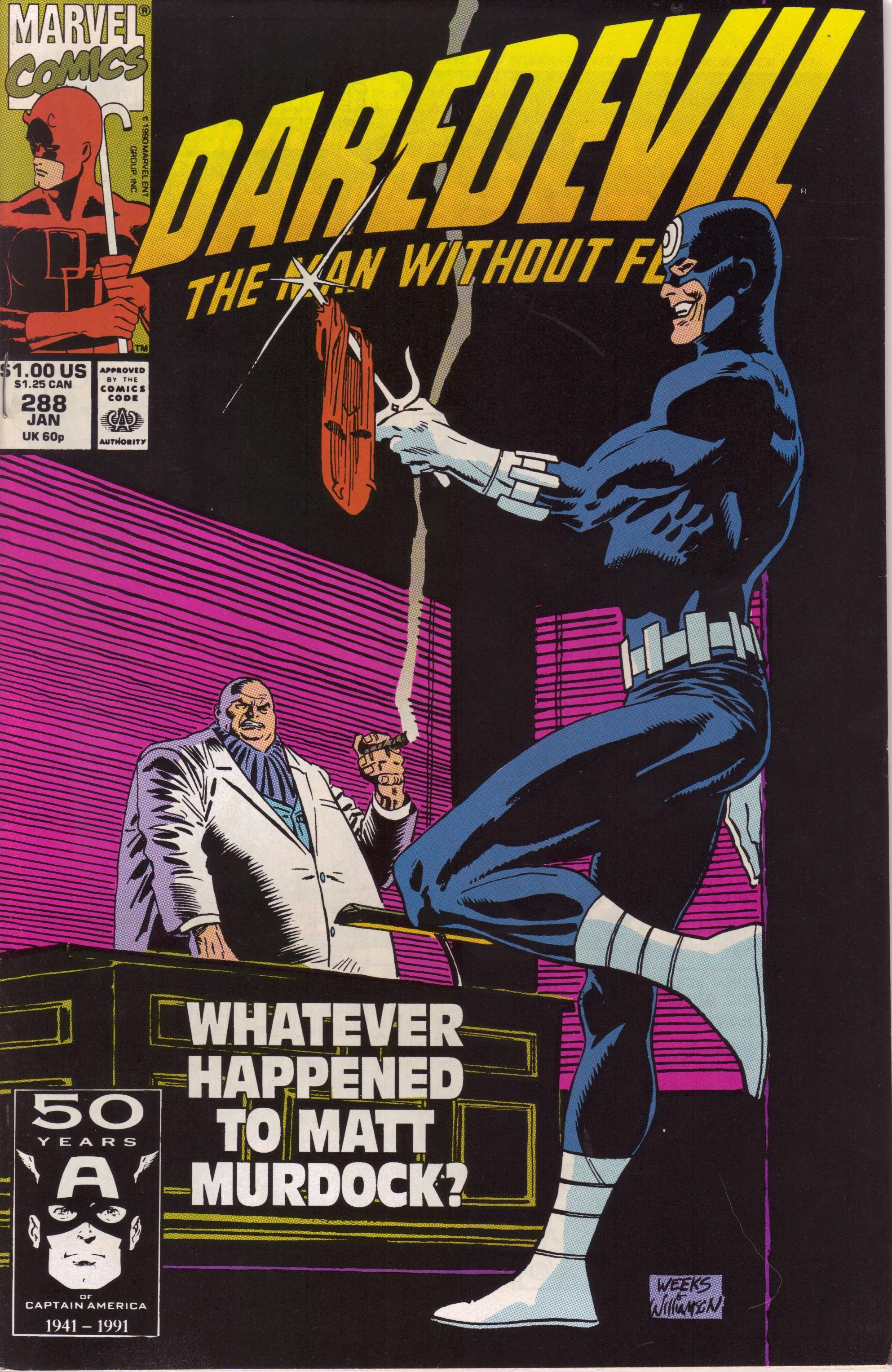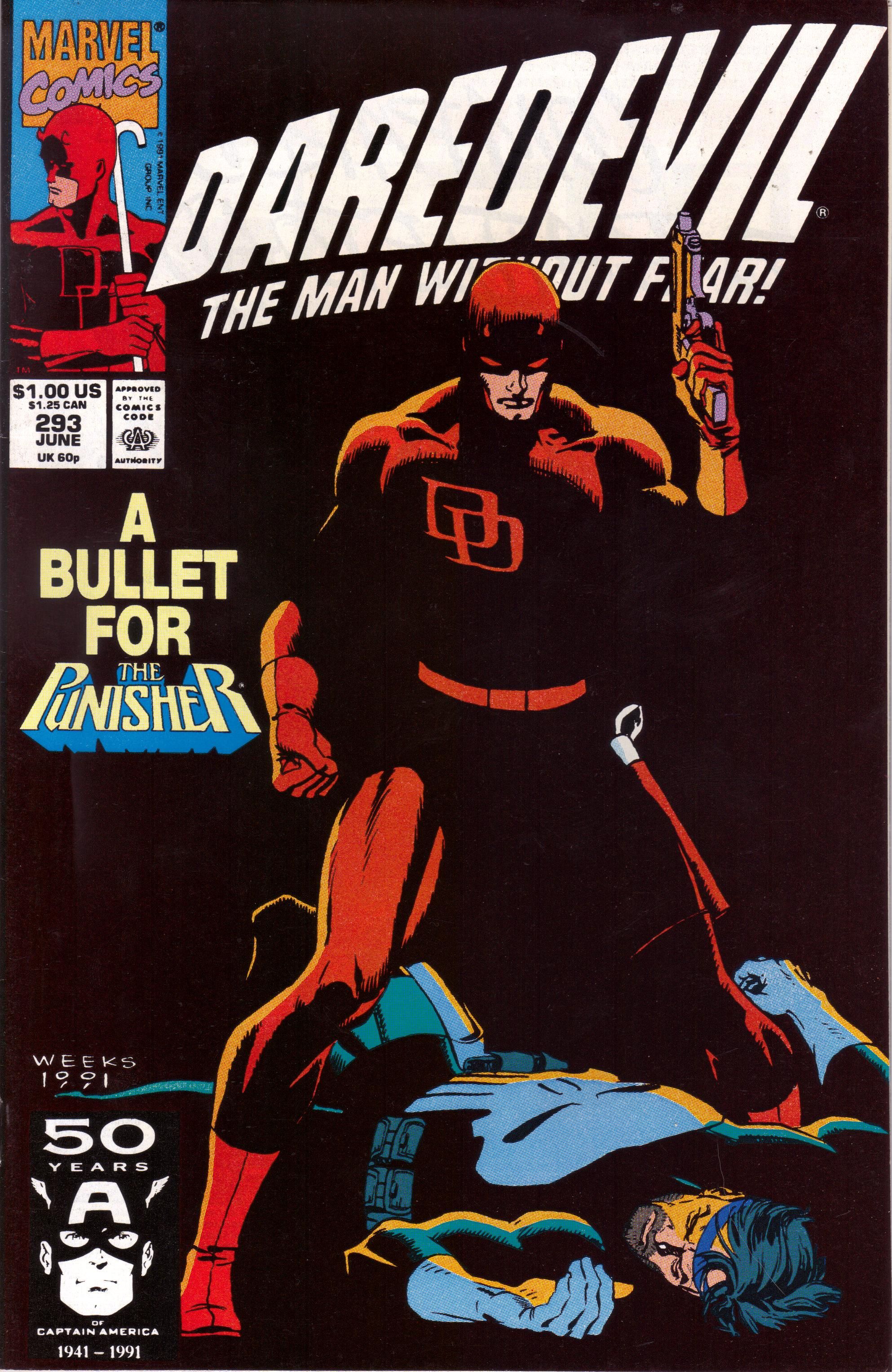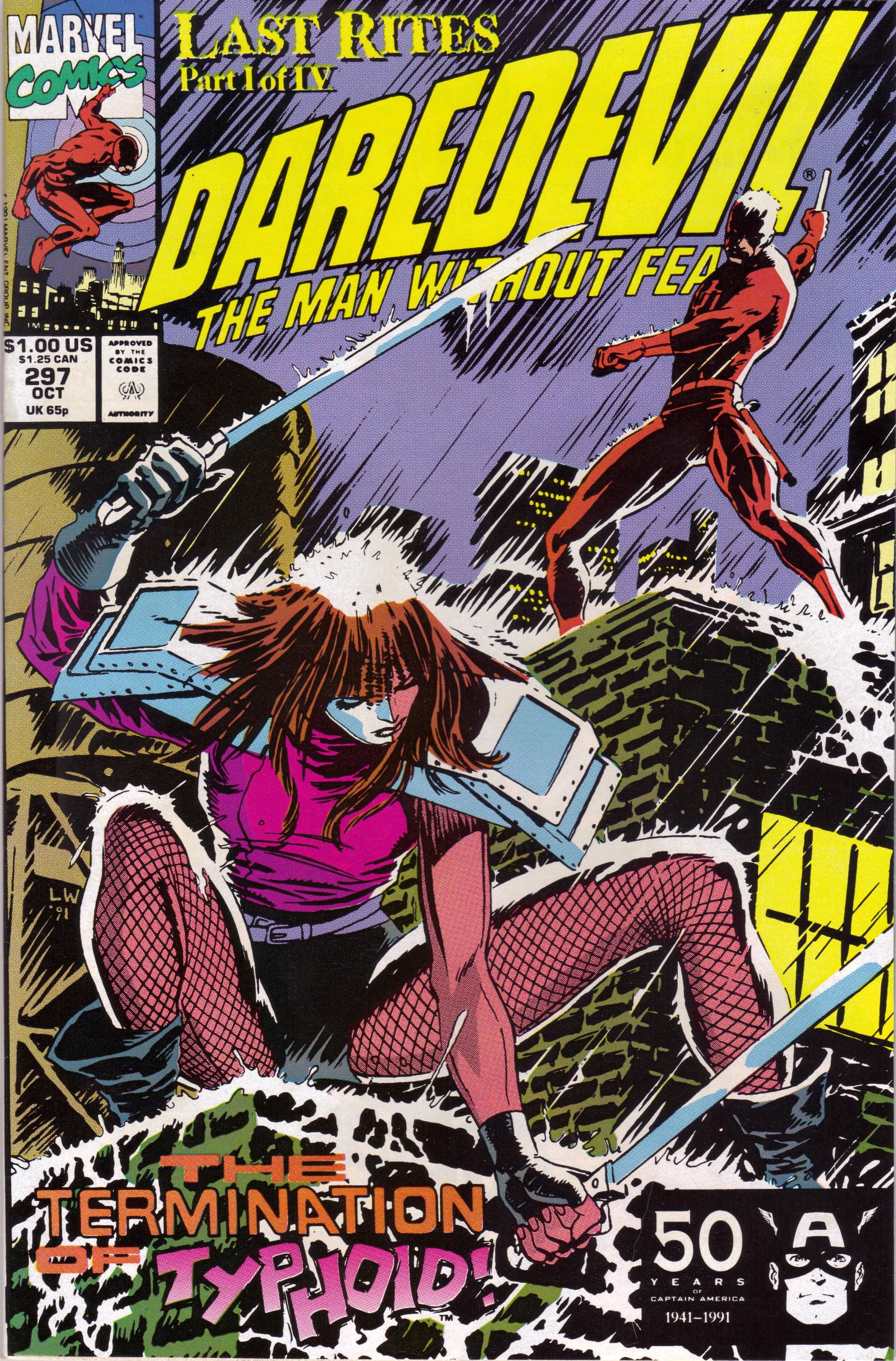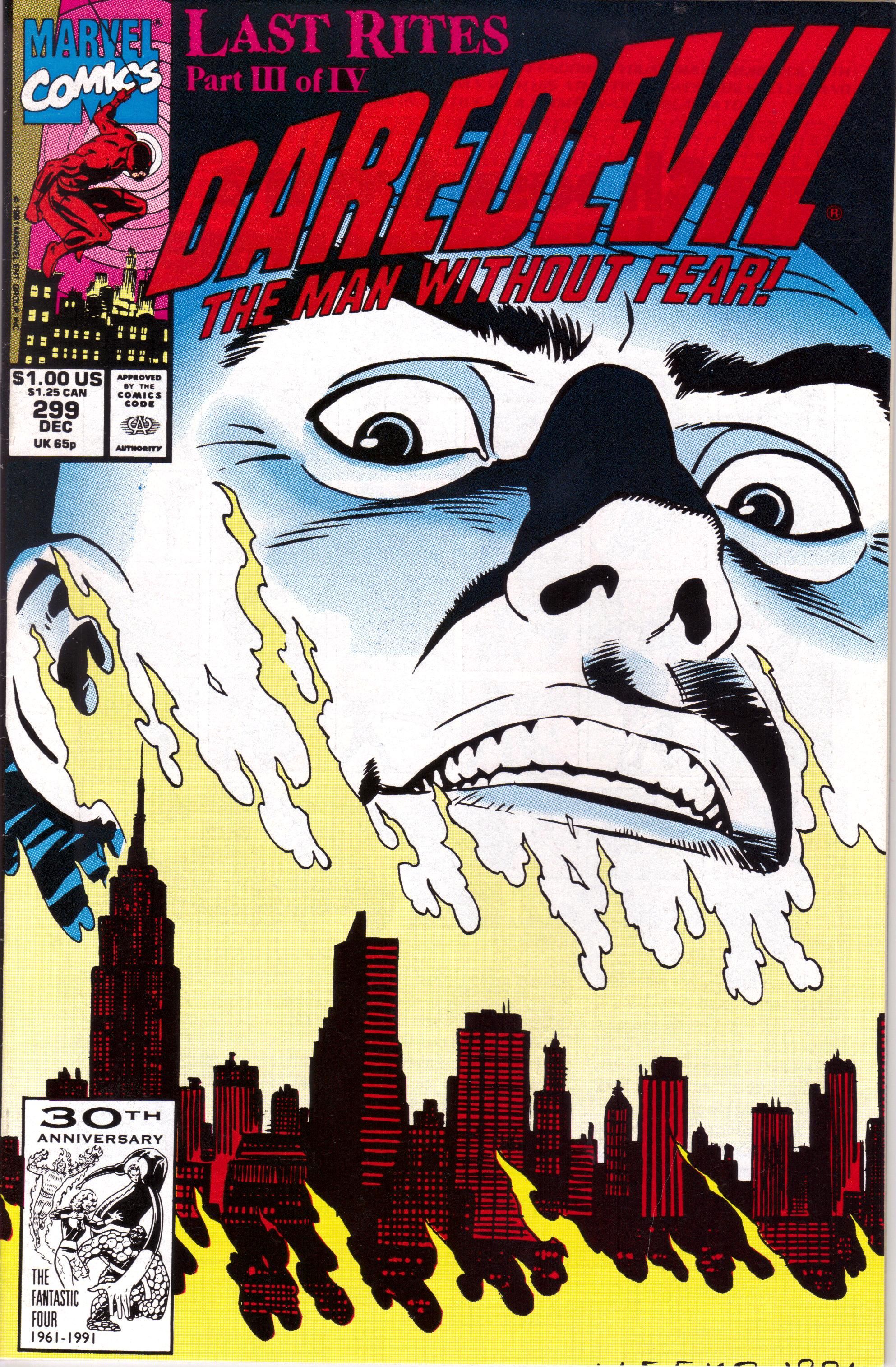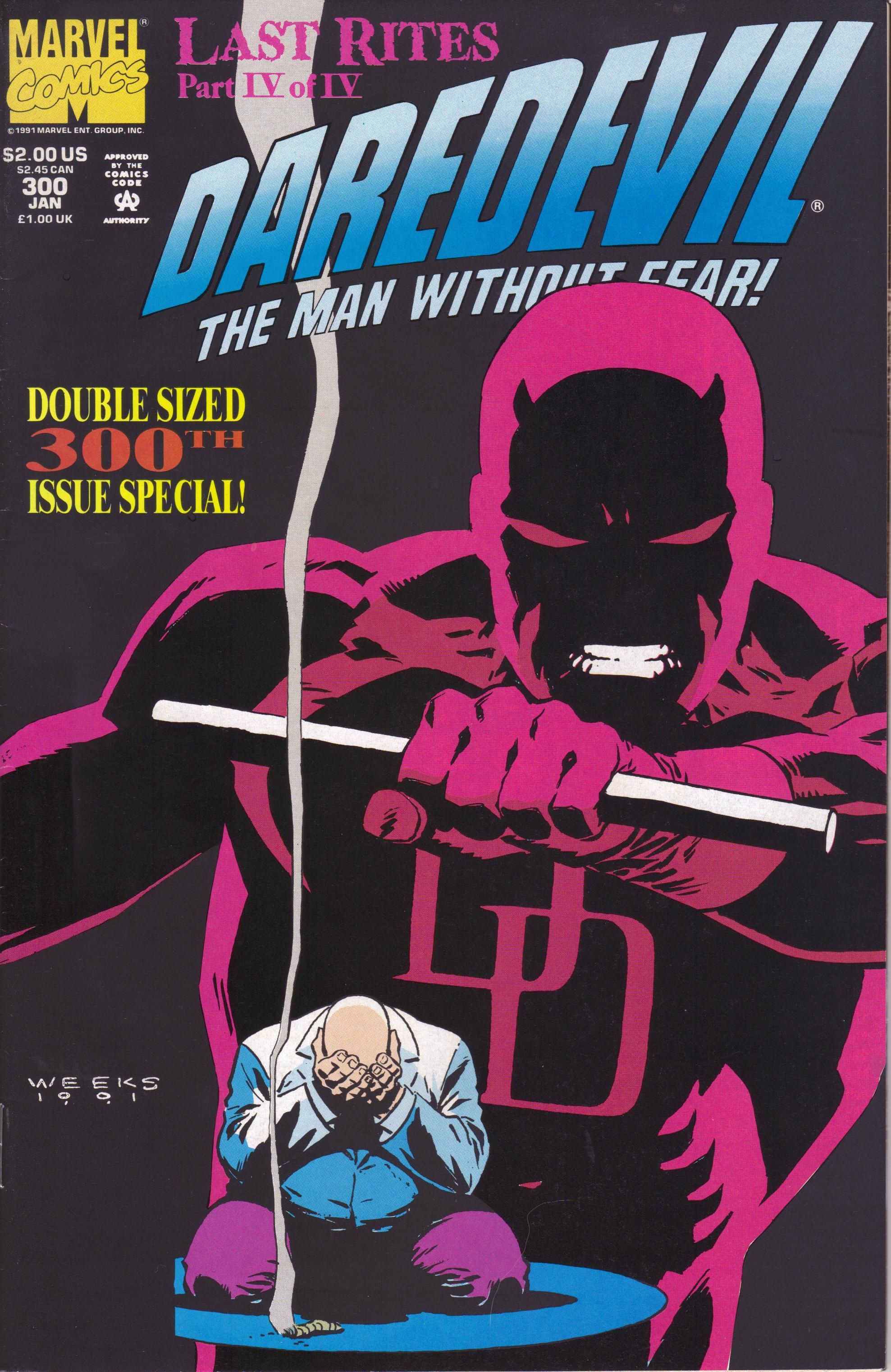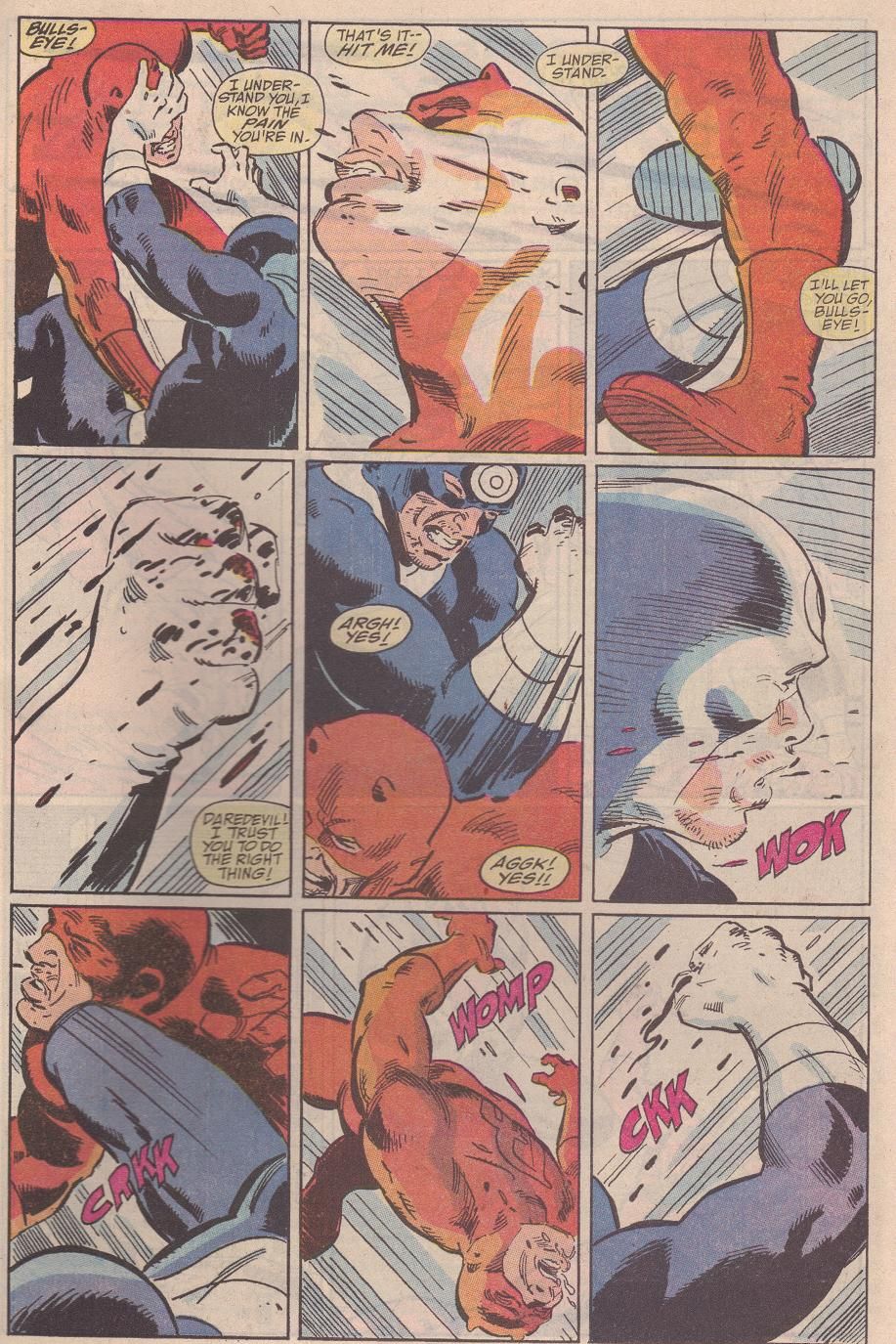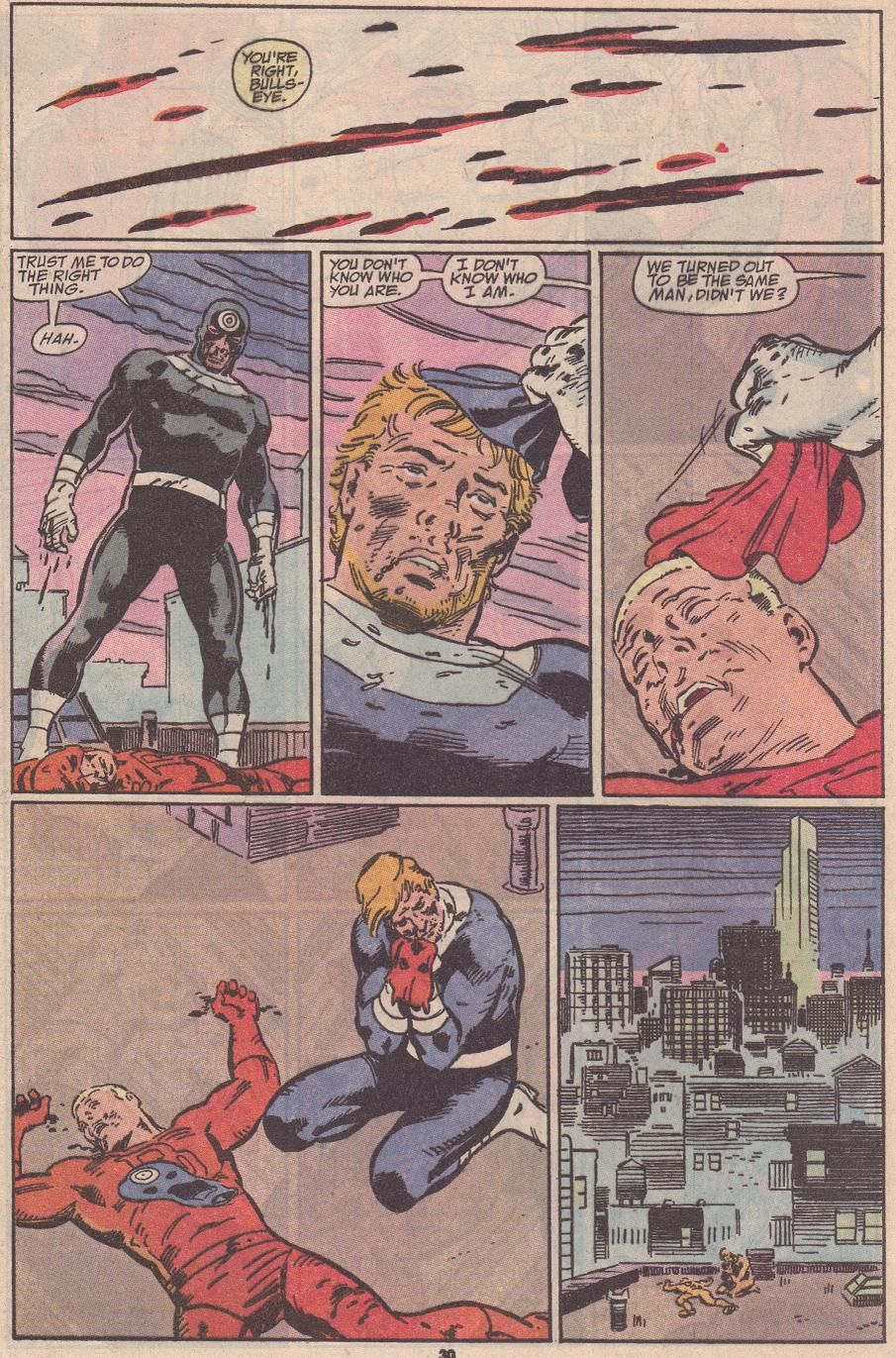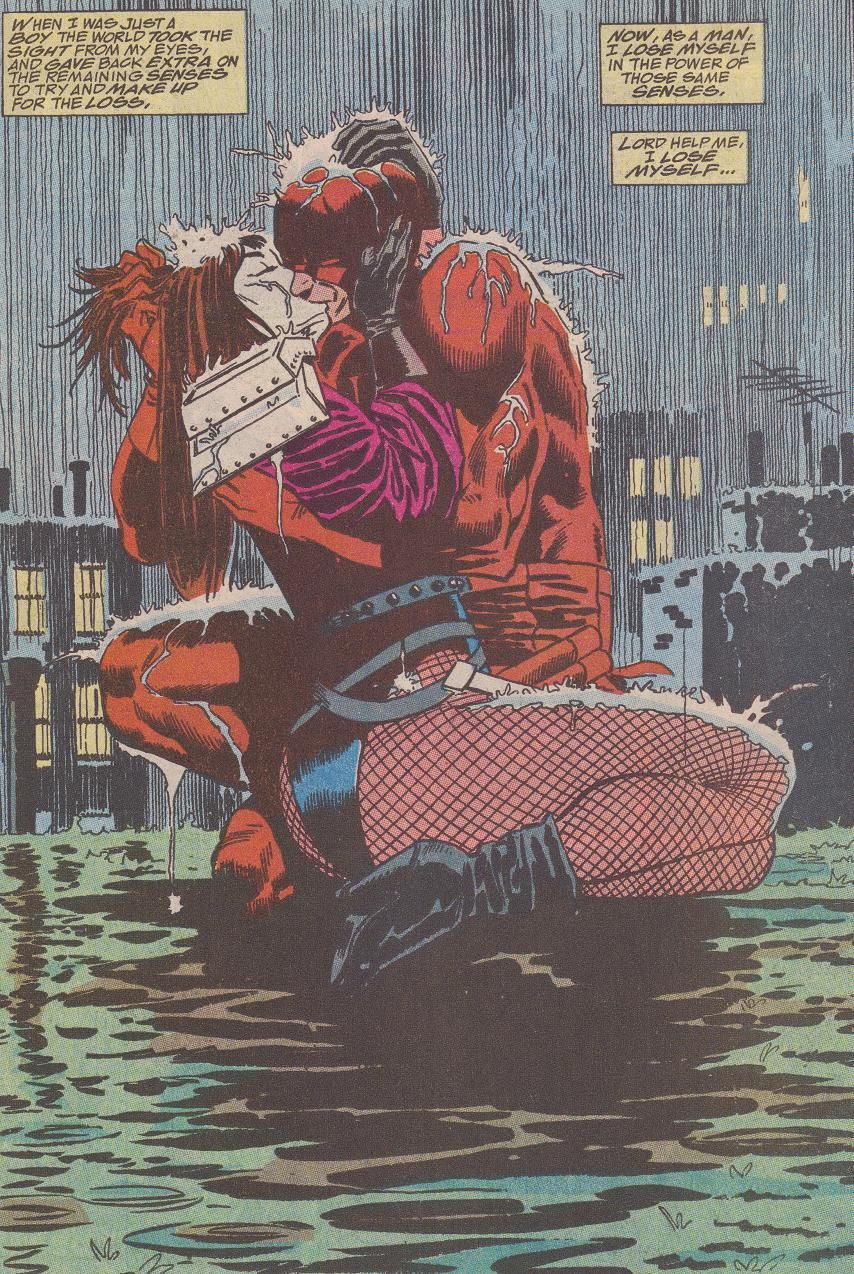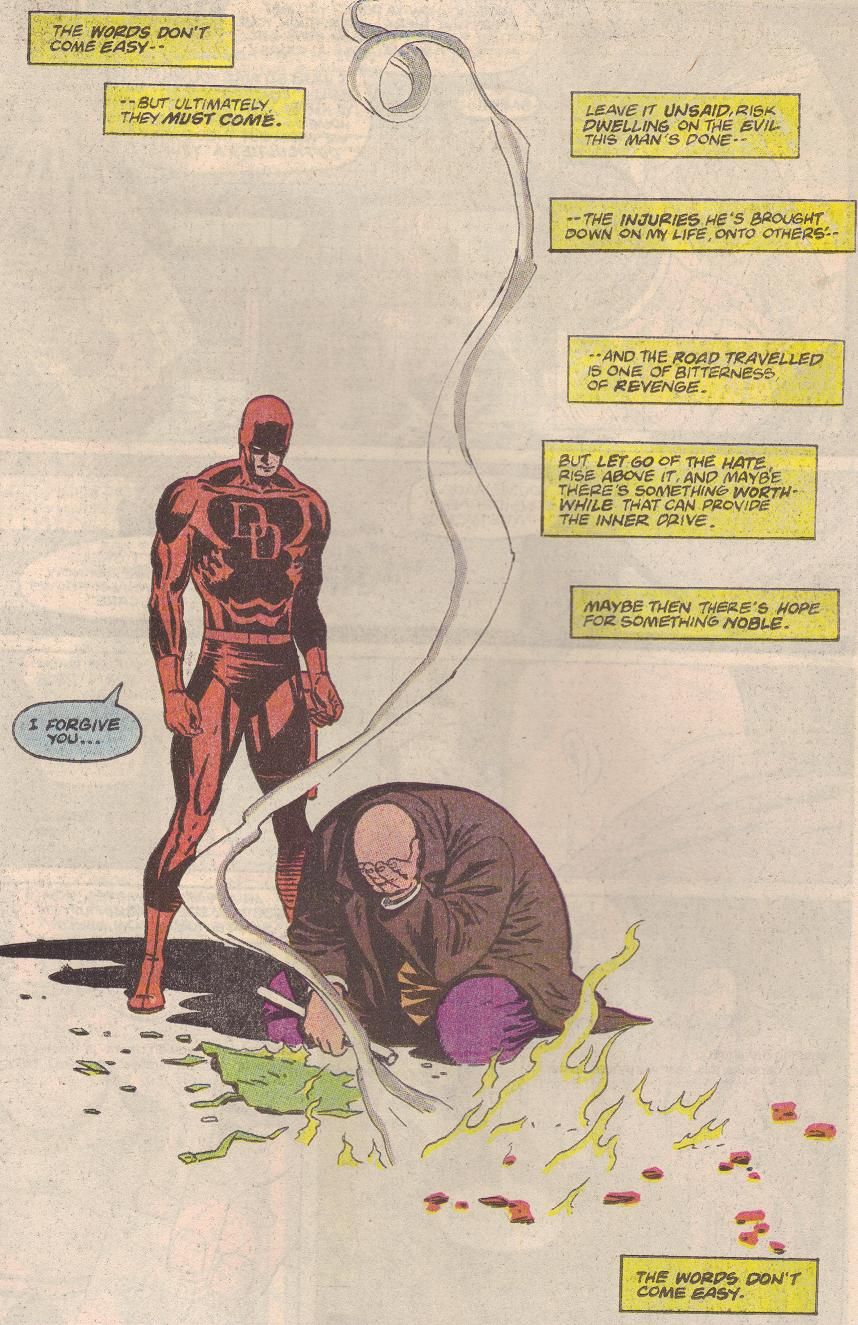You know, recently I got most of the early Nocenti issues of Daredevil, but I haven't read them yet. I've read a few, but I can't really comment on them. So you'll just have to deal with these, which feature the end of her run!
Daredevil by Ann Nocenti (writer, issues #283-291), D. G. Chichester (writer, issues #292-300), Lee Weeks (penciler, issues #284-285, 287-288, 291-295, 297-300), Mark Bagley (penciler, issue #283), Greg Capullo (penciler, issue #286), Kieron Dwyer (penciler, issues #289-290), Ron Garney (penciler, issue #296), Al Williamson (inker, issues #283-285, 287-289, 293-300), Tom Morgan (inker, issue #283), Doug Hazlewood (inker, issue #286), Fred Fredricks (inker, issues #289-292), Max Scheele (colorist, issues #283-287, 289, 291-300), Mike Rockwitz (colorist, issue #288), Nelson Yomtov (colorist, issue #288), Steve Buccellato (colorist, issue #290), Clem Robins (letterer, issue #283), Jack Morelli (letterer, issues #284-290, 292-297, 299), Brad Joyce (letterer, issue #288), Joe Rosen (letterer, issue #291, 300), and "M. Hands" (letterer, issue #298).
Marvel, 18 issues ("Volume 1," #283-300), cover dated August 1990 - January 1992.
Pretty big SPOILERS below. Sorry!
All writers and artists who toil on Daredevil do so in the shadow of Frank Miller and, to a lesser extent, David Mazzuchelli. Miller took a moribund character in the late 1970s and infused it with "street" attitude and Eastern mysticism. He created Elektra, Matt's only real equal in romance (sorry, Karen Page fans). Later on, he returned to the book and, with Mazzuchelli, gave us "Born Again" (issues #227-233), in which he did one of the only logical things left to do with Daredevil: Allowed Wilson Fisk to learn his secret identity. "Born Again" is a magnificent achievement, but some people have wondered if Miller left future writers with no place to go.
At the end of "Born Again," Matt Murdock has very little: His home has been destroyed, he has been disbarred, and the Kingpin knows his secret identity. However, there were plenty of places to go with Murdock; it was up to subsequent writers to find out where.
Ann Nocenti came onboard a few issues after "Born Again" and stayed for five years. I own only the end of her run [Edit: As I pointed out above, that's not true anymore], but I know she took Murdock to Hell, and had him battle Mephisto with the help of the Inhumans. Many readers of the time, if the letters are to be believed, wanted Murdock back in Hell's Kitchen, and her final issues, which begin with #283, take him back there, with unexpected results. Chichester came on with issue #292, and the difference between his style and Nocenti's is interesting. With the help of the brilliant Lee Weeks, he took Daredevil back to his roots but also moved the character forward as much as Miller did, with much less fanfare. Nocenti's work, while very good at the end, is less essential than Chichester's, and it's a shame that fans seem to think that after "Born Again," the title went into hibernation until Kevin Smith and Joe Quesada showed up in 1998.
Nocenti used the end of her run to push a political and social agenda, which turned some fans off. You can be against her politics, however, and still appreciate what she is trying to say in the work. Matt Murdock, who has lived in the worst part of Manhattan and seen such corruption on a grand and high scale, should be a bleeding heart liberal. Perhaps a reader could object to the way Nocenti beats us over the head with it, but that same reader can't object to the way Matt is portrayed.
At the same time, only in a few instances does she allow her political stance to interfere with the story of how Murdock returns to Manhattan and overcomes that hoariest of clichés, amnesia. The politicization of the title was an interesting experiment that Chichester backed away from a little, but it fits into the overall theme of the comic - Daredevil as Protector of the Downtrodden, especially in his little corner of New York.
The most annoying of Nocenti's polemical issues, actually, is the first one I think you should own. Issue #283 is a bit of a fill-in, as Matt gets out of Hell, says goodbye to the Inhumans, and wanders off. He ends up in a small town where, in a coincidence that can only occur in a comic-book universe, Captain America happens to be. The good Captain is going through his own "crisis of faith," as he believes the American values he fought for are being undermined. This depiction of Captain America I have a bit more of a problem with, not because I disagree with his politics - I also believe the drug war is a foolish thing that hurts low-income users more than it hurts high-income dealers - but because it seems so imposed by writer fiat, and not even the writer of his regular book. His rant on page 4 feels like something Nocenti wanted to say, so she put it in Steve's mouth. It feels phony. The whole story feels that way - like a Sermon on the Mount. In this small town, an immigrant has created a flying car that runs on garbage. Of course, this is a threat to the big car companies and their pals in the U.S. government, so they try to intimidate the defenseless immigrant both "legally" and by sending thugs to his house. The thugs succeed in destroying the car (which is a prototype and was built without plans), despite Daredevil and Captain America protecting it, and the immigrant (Viktor) leaves, seemingly to commit suicide by leaping from a building in town.
At the last moment, we see that he has built a jetpack and can fly, proving once again that the Dream of America cannot die even if the mean government wants to destroy it.
There's a lot wrong with this issue, especially in the context of the Marvel Universe, with its crazy inventors who could make jetpacks and cars that fly using garbage as fuel with one hand while battling Ultron with the other. It's simplistic in its morality and unworthy of a complex character like Daredevil. In fact, it's not even really a Daredevil comic; it's a Viktor and Captain America comic. Why then, do I include it with the rest of the run? Because of continuity - it sets the tone for the rest of Nocenti's run, giving us a hint of Matt's coming mental problems and also her more nuanced examination of race and class politics that she gets into once DD returns to New York. It's not a terribly good issue, true, but it's a place to start.
Issue #284 begins Nocenti's final storyline with Daredevil, and in it she decides to examine the nature of heroism and why Matt is indeed a hero. She also wants to look at how race affects our perception of people and politics. That's a subplot, though, to the main thrust of her story - the yin and yang of Daredevil and Bullseye. Every hero needs a nemesis, after all, and it's far too easy to ignore the similarities between the hero and the nemesis. Writers have explored this duality, but not too often, especially 20 years ago. Nocenti dives right in, and provides us with no easy answers. In issue #284, Matt loses his memory. Amnesia is a silly plot device and doesn't work the way Nocenti says it does, but we simply move on because we recognize it as a MacGuffin and don't worry about it.
We can accept it because Matt has literally been to Hell, so we can understand why he might want to forget it. He hallucinates and begins to doubt who he is, and in an interesting scene, he stops fighting because he recognizes the futility of it all. This leads to Bullseye taking his identity, and Matt becoming "Jack" Murdock. Jack doesn't know he's blind (not right away, but he figures it out) and doesn't know who he is. These two men explore who they are and why they do what they do. Bullseye is, of course, a few bricks shy of a load himself, and taking Daredevil's identity messes him up even more. He isn't sure if he is a hero or a villain. He wants to destroy Daredevil's image, so he starts stealing. He screws up, however, by giving the money to the poor, just like Robin Hood. This endears him even more to the populace, so he has to go even further. He turns to street murders in an effort to drag Daredevil's name through the mud. This smear campaign works on the New York media, with the exception of Ben Urich, who is convinced something is horribly wrong.
Bullseye is an interesting character here. He is clearly insane, but that doesn't mean he doesn't offer some insight into what makes Daredevil tick. Is Murdock crazy for putting on tights and fighting crime? Bullseye certainly seems to think so. He understands the rush of being a vigilante, but being who he is, he can't understand why Matt doesn't turn to theft and murder. By the time he has his final confrontation with Murdock, he no longer has his own identity - he has become lost in the "Daredevil" identity and can't get out. He's locked into the persona, and only a beating by Murdock can possibly get him out of it.
Matt Murdock is going through his own identity crisis throughout these issues. He decides that he is Jack Murdock, and he gets together with a woman who lives in a burnt-out building and steals for a living. He also meets a judge who is being threatened by street punks. These two stories converge around Nocenti's desire to make a statement about race and class in this country. The woman Matt meets, Nyla, is black. In an obvious ploy, but one that is still effective, Matt doesn't know this because he's blind. When Nyla understands this, she is wracked with doubt over their relationship, and she fears that Matt will reject her when he finds out. He doesn't, of course, but his blindness becomes a nice, built-in metaphor for seeing race in America. If only, Nocenti is saying, we can all be blind like Matt to Nyla's color, because it doesn't matter. Meanwhile, the judge is black, and the punks hassling him are white. They feel he is being easy on the blacks who come in front of his bench and tougher on the whites. They beat him up (while Bullseye, dressed as Daredevil, looks on), but Matt helps him and gets him back to his home. His son, Marcus, an "angry black man," is furious over this, and Matt offers to help get him to work safely.
Anyone can see where this is going, and the judge is killed when Matt is late. Marcus goes after the punks who killed him, telling Matt he knows nothing of "black justice" - there is none, so they make their own. It's interesting hearing someone accuse Matt Murdock of not understanding anything about justice, but in a way, Marcus is right; Matt can't understand what Marcus and his father have gone through, despite his constant battles for the "little guy." In Marcus' eyes, even Matt, with his difficult childhood and his disability, would be privileged - simply because the color of his skin would offer him opportunities Marcus would never get. It's an interesting take on Matt and what he considers justice. Nocenti puts another spin on the story - the killers know Marcus from when they were children, and they didn't hate each other then, but they learned it as they grew up. The last time we see Marcus, he's pleading with the killers' accomplice to help him, because, Nocenti points out, it's no longer about race in this country, it's about class, and the rich and powerful want the races to hate each so they can exploit them all. It's a somewhat obvious conclusion, but the way Nocenti gets us there is well done and subtle.
As I mentioned, Matt is dealing with this race/class dichotomy in his own way. He and Nyla break into a penthouse and begin to rob it, but Matt, despite his amnesia, is a decent fellow, and he decides it's wrong. Nyla can't believe it; the place they're robbing belongs to a guy who made a fortune in junk bonds, while welfare for working mothers in Harlem is cut. She asks Murdock where the justice is, and he really doesn't have a good answer for her, except that it's wrong. Matt is concerned with justice, but what kind of justice? If it's the justice that comes from the law, then Nyla wants nothing to do with it, because the law has been written to keep her - not the black her, but the poor her - down. Matt can't see that his law, the foundation of his belief system, might be corrupt, and therefore the entire system is corrupt. All he can do is turn away and go visit the judge, who, it turns out, could have used his protection a little sooner. The interesting thing about this entire vignette is not that Nyla is right - that's something for sociologists to argue - but that Matt is so clearly wrong. Wrong at least in the sense that he can't realize that his precious law has utterly failed this young woman, and wrong in that it has also failed Marcus and his father, even though they appear to be on the "right" side of the law.
Superheroes aren't supposed to be wrong, but Matt is, and he fails Nyla, the judge, and Marcus - all black people.
The final stage of Matt getting his memory back is when he becomes a boxer in order to show Nyla that she doesn't need to steal to make a living. He blindfolds himself and becomes a sensation. Wilson Fisk, not understanding that Matt has lost his memory, decides to screw with Matt's mind once again, and sets up a situation exactly like the one Matt's father found himself in. Fisk's plan backfires (of course) when the scene jolts Matt's memory and he regains the knowledge of who he is. He thinks for a time that he is his father, but then he realizes that his father played out the same scenario years earlier and that he watched it happen. This brings his memory back and he rescues Nyla, who had been kidnapped to ensure Murdock's complicity. With the return of his memory, he confronts the Kingpin, setting up Chichester's run nicely as he tells Fisk his empire is over, but first he has to undo the damage that Bullseye has done in his name.
Issue #290 is the "final" conflict between Bullseye and Daredevil. It's a marvelous fight issue, mainly because Bullseye is still wearing the devil costume, so Matt puts on Bullseye's costume and they switch roles for the fight. As both are struggling with their identities, they fight and argue over who exactly is who.
There's a nice sequence when Matt, dressed as Bullseye, falls off a ledge and Bullseye (dressed as Daredevil) grabs his arm. When Matt appeals to "Daredevil" for help, there's a beautiful panel by Dwyer in which "Daredevil" says: "You're right - no one has to die." Bullseye has gotten so into his persona that he no longer knows who he is and what he usually does. As he remembers that he's a bad guy, "Bullseye" grabs "Daredevil" and hurls him off the roof. As we realize that Bullseye is the one who is being compassionate and Matt is the one who is being evil, it jolts us because this is not how these men should act. Matt is acting out because he wants to confuse Bullseye and make him doubt, but it's still unsettling. He baits "Daredevil" into mocking him because he, "Bullseye," has never been able to kill him, and this makes "Daredevil" uncertain, because he knows he's not really Daredevil. The final beatdown, a nine-panel page of brutality, is exquisite because we're not exactly sure who's talking. The two men have become so entwined that it no longer matters - they are the same, and all that matters is who can triumph in a test of brute strength. The last page is poignant; Matt pulls off his Bullseye mask and says: "You don't know who you are. I don't know who I am." He then takes his mask back and says: "We turned out to be the same man, didn't we?" This is a powerful ending to a twisted and disturbing story, and it mitigates a lot of Nocenti's ham-fisted storytelling from earlier issues. She has led us to this point, and although we may have been annoyed with some of the turns along the way, the ending more than makes up for it.
It feels like a final issue, but Nocenti returns one more time, and in issue #291, she brings Matt and Foggy back together and also sets up Chichester's run.
This was time when writers didn't necessarily put their stamp on books (some did, but not as much as today) with cataclysmic beginnings and endings. Nocenti's final issue is a nice way to end, but it doesn't destroy the status quo, and in fact it offers Chichester some nice toys to play with. Nocenti shows some of the Kingpin's moves toward "legitimate" business, as he begins to look to the entertainment and news sector. In this issue, we get more interesting interplay among the principals, and Bullet has some nice scenes, which help humanize him and help us gain some understanding into why he is the way he is. J. Jonah Jameson and Ben Urich have some nice interaction, although Jameson's change of heart is telegraphed far too easily. Still, Nocenti's themes of the rich and powerful getting their way are still woven into the fabric of the book, and she has gotten to the point where she doesn't need to beat us over the head with them. It's a much more subtle book than #283, and that had been less than a year before. It's a nice way to go.
Dan Chichester took up the reins with issue #292, and he and Weeks (with Garney drawing one issue) completed a storyline that is monumental in the history of Daredevil: The destruction of the Kingpin. In "Born Again," Miller makes Fisk "a villain … in the eyes of everyone except, as yet, the law," so Chichester takes that to its logical extreme - he becomes a villain in the eyes of the law. While Fisk is trying to establish himself as a media mogul, Matt decides he has had enough of the Kingpin. This hearkens back to Nocenti's run, when he rescues Nyla and confronts Fisk - I don't know if Nocenti knew Chichester was going in that direction, but she probably talked to him.
Again, this is from a time at Marvel when editorial control was actually that, and writers couldn't go off in wild directions. Whether that was a good thing or not, it means that we have a smooth transition from one writer to another without too much of a snag. We can tell it's a different writer - Chichester is much more eloquent, especially when describing the way Matt "sees" - but it's not that big of a jolt.
Issues #292-296 set up Chichester's grand storyline, as Hydra, through intermediaries, attempts to seize some control of the city's underworld from the Kingpin. They also send an agent disguised as a hokey businessman to provide investment capital for Fisk's new media empire, which allows the terrorist organization access to Fisk's accounts and eventually, all his assets. Daredevil fights Tombstone and Taskmaster alongside the Punisher, and then the Hand alongside Ghost Rider. The inclusion of two of Marvel's "hot" properties of the early 1990s is annoying, but necessary on some level, I suppose. A good writer can take editorial intrusions (which I presume these guest stars were) and make them work in the context of the story, and the Punisher and Ghost Rider don't detract too much from it. These issues offer us slam-bang action and hints at things to come, and by the end of issue #296, Matt has had enough of his dance with Wilson Fisk and promises to bring him down once and for all. This sets the scene for issues #297-300.
The idea of destroying the Kingpin, as I said, had been toyed with over the years, especially during "Born Again." Chichester wanted to show how one man, standing up for justice and playing all the angles, could bring down evil.
The journey Matt takes to end the Kingpin's reign is not necessarily a noble one. This allows Chichester to examine how far we should go to defeat evil, and whether it's worth it if we ourselves become tainted by that evil. Matt certainly thinks it's worthwhile, but even he doubts as his plan unfolds, especially when he goes after Typhoid Mary in issue #297.
Nocenti created Mary back in issue #253, and she's a grand metaphor for shy people who long to break out of their shells. Mary quite literally becomes a different person when she wants to be aggressive, even to the point of gaining telekinesis and having a higher body temperature. By the time Chichester's run began, she was Fisk's house assassin and lover. Matt begins his assault on Fisk by going after Mary - the history is there, after all, since in her original appearance, Mary seduced Matt. Issue #297 begins with Matt visiting Fisk in his penthouse and mocking him. It's a disturbing scene, simply because we usually see Daredevil as a brooding, serious figure. Here, however, he turns the tables on Fisk and leaves him with a reminder of all that he's lost - a curio with a picture of his estranged wife, Vanessa, inset. Vanessa left Fisk long ago, and Matt wants to drive a small splinter of emotion into Fisk's heart, so that he will be easier to break. Fisk has become such a mythic embodiment of evil that Daredevil needs help to destroy him - help that the memory of Vanessa can give him. This insidious cruelty by Matt is unnerving, because we want to think that Daredevil, as a lawyer, would go after Fisk with legal techniques. But the vigilante in Matt knows that the time for legalities has come and will come again, but to put that first, crucial chink in the Kingpin's armor, he needs to get nasty. Fisk later rejects Typhoid's advances because he's too busy thinking about Vanessa, so she goes out into the night, where Daredevil is waiting for her.
The way he takes down Typhoid makes us realize that Chichester is not writing this like a typical superhero book. He wants to deal with Matt's feelings toward women, his feelings toward his arch-nemesis, and his Catholic upbringing. Therefore, Matt turns the table on the "Typhoid" aspect of Mary's personality. Typhoid is always the aggressor, but by being aggressive himself, Matt catches her off-guard. She is confused when confronted with a sexually aggressive (not in a violent way) male, someone who matches her power and forthrightness. When Matt takes the initiative, the real Mary, the shy one, comes out again, as that's all Mary ever wanted - someone to take care of her. She had to create Typhoid to do this, and when she thinks Matt will take over that role, she retreats back into the shy girl. Matt knew this would happen, and called Social Services to take her away while she was less of a danger. It's a sad scene when Matt ruminates on what he's done; he looks down at the sleeping girl, now no threat to anyone, and thinks, "It's easy to forgive the real Mary the sins of her dark half ... I only hope she can forgive me mine..." The idea of forgiveness, and who forgives and whether those who are forgiven deserve it, has come up before, in Nocenti's treatment of Bullseye, and Chichester will return to it again. Matt's Catholicism is an interesting part of his character, and although occasionally a Catholic writer will pound us between the eyes with it (if you're thinking of Kevin Smith, so am I), it's nice to see a writer incorporate it into his personality without making it the overwhelming factor in what he does. Matt's destruction of Typhoid juxtaposes nicely with his brutal treatment of Wilson Fisk in the later issues.
The story continues as Matt gains unlikely allies - first, S.H.I.E.L.D., when Nick Fury claims he wants Matt to back off, but he really wants him to take down Fisk so he doesn't have to; and Hydra, who is getting into Fisk's empire in other ways. The fascinating thing about this story is watching the Kingpin's slow unraveling into a common thug, something we haven't seen in a long time. Sure, writers have shown how brutal he can be in a casual business sense - it's almost a cliché that every time the Kingpin shows up, someone is going to say something stupid and Fisk is going to kill him with his bare hands - but when Fisk finds the curio of Vanessa, something inside of him snaps, and we see him out of control for the first time in decades.
It's interesting to watch Matt take him apart slowly, because for most of their relationship, the roles were reversed. It's rare to see any hero, especially Daredevil, so in control of the situation and so confident in his abilities. Batman and Superman are in control, sure, but they're the big guns. Marvel superheroes, especially, often seem to luck into the solutions to their problems. Daredevil is often a mess, finding solace only in battering street punks. But Chichester makes him supremely confident for the first time in a long time, and we know that he is going to win - it's just a question of how and also how far the Kingpin will fall.
Wilson Fisk becomes a much more interesting character in this arc, as well; more so even than "Born Again." In the Daredevil graphic novel that Miller wrote (with Sienkiewicz on art), we get a sense of the man behind the façade, and Chichester expands on this, so that although we don't pity Fisk, we become fascinated by his rise and his fall, and we marvel at how a man could hold this crime empire together with just his will for so long. Matt plants seeds of doubt throughout his criminal territory, using the Hydra takeover to make Fisk's underlings wonder whether the man is still in charge. If it sounds too easy, Chichester reminds us that Fisk is trying desperately to become a "legitimate" businessman, and perhaps his lackeys no longer think he is "one of them." Fisk himself thinks about "getting his hands dirty" again, and in issue #298, he explodes in a volcano of rage when a Hydra representative tries to muscle him. He clubs the man to death with his cane, and the panel is shocking, not necessarily for its violence, but for how out-of-control Fisk appears.
This is a man who, in that instant, has lost to Daredevil, because he can no longer control his base emotions, and that's how Daredevil will ultimately defeat him. Back in issue #289, when Matt confronted Fisk after rescuing Nyla, the Kingpin said nothing, just smiled at our hero. Now, Fisk is no longer smiling, and the switch is astonishing.
He still fights, though, but Matt now has Hydra and the federal prosecutor on his side. In a true coup d'etat, Hydra swoops in and destroys all of Fisk's property holdings in New York. I certainly can't endorse terrorism, but it's nice to see a writer treating Hydra with some respect - they actually accomplish quite a bit in these issues. In a great line, just as the Hydra spy escapes Fisk's wrath and while the explosions are still going off in the background, he says, "You are only a criminal, Mr. Fisk. And we ... We are conquerors." Fisk clenches his fist in frustration, because he has been exposed as nothing but a petty crook. All the veneer has been stripped away, and in the last panel of the book, Daredevil listens to the cacophony and smells the fires and thinks to himself, "I'm not smiling. I'm not…" as a big grin crosses his face. This is triumphant and unsettling, because we don't want our heroes to take such joy in the ruination of their enemy. Satisfaction, yes, but not joy. Yet Matt has completely given in to Schadenfreude, and we're swept along with it.
All that remains after destroying the man's economic status is to destroy his reputation completely.
Issue #300 is the culmination of the story, obviously, and although it seems like the Kingpin can't fall any further, Chichester makes it clear that he can. He is brought in by the Feds. The prosecutor, Kathy Malper, tells Daredevil he plays the role of wounded spice merchant too well, and the grand jury might not indict him. Daredevil has a plan to crack the last bit of his facade. This will lead to the grand guignol between the two men, and ties nicely back into the foundation laid by Frank Miller. The Kingpin hears that a state senator is willing to help him if he can find the killer of a cab driver, who was her cousin. That cab driver is the same one the Kingpin had killed during "Born Again" when he put Matt Murdock in the taxi and sank it in the river. He used Matt's billy club to bludgeon the man to death, and then made sure Matt's fingerprints were all over the club. He then locked the club away for safekeeping, "for a rainy day," and now it's pouring. The whole thing is a set-up - there is no deal, and Matt wanted to draw Fisk out into a desperate public situation, so that everyone would know what kind of man he really is. Fisk has nothing left, and he snaps. When his credit card is rejected, he smashes the window of the parcel check area where he stashed the club and drags it and the clerk out, and Weeks shrouds his face in shadows, with nothing hiding his true nature from the world any longer. The fight in the bus terminal is a ballet of violence and retribution, as Fisk scrambles to escape and Daredevil follows gracefully, fully aware of everything Fisk could do and fully in control. He thinks to himself, "If I could see, I know I'd view it there on his face. The dread certainty of what all his machinations, all our confrontations - of what all of it's come down to. A man filled with panic. And a man without fear."
He has broken Fisk, and all that remains is to pick up the pieces and make sure that the billy club, which could, after all, be used as evidence, is destroyed.
As Fisk staggers out of the terminal (and in front of Peter Parker, who lets Daredevil enjoy his moment), Matt thinks to himself, "If it were anyone else, I might even feel pity." In a much more subtle way than the more recent fall of the Kingpin (the Bendis one), Chichester lets us know that Matt has taken Fisk's place, much like he took Bullseye's place. "The abyss gazes also" and all that, but Matt can be better than that. On a wonderful page, after Fisk has lost everything, Matt stands over him and thinks, "The words don't come easy ... But ultimately, they must come." He forgives Fisk, because he knows that he must let go of the hatred and be the better man. Perhaps then, there is "hope for something noble."
Chichester's epilogue shows us that, although Fisk has been broken, perhaps Daredevil did him a favor. His former crime bosses are lining up to treat him as their lackey, but the Kingpin isn't going to allow that to happen. He kills one of his former underlings, Gerry "The Whale" Sabatini, and as he shoves his cane deep into Sabatini's gut, he tells him, "You've helped me realize a part of myself I thought I'd lost forever! Now I feel like a man with a second chance ... A man ... born again..." The obvious echoes of Miller's grand storyline make us understand that what Chichester is doing is the opposite of what Miller did. Miller destroyed Daredevil to show us the true core of the hero, and now Chichester has destroyed Kingpin to show us the true core of the villain. Fisk has been "respectable" too long, and has lost that sense of menace that we came to associate with him. As he washes the blood off of his hands (an obvious Pilate reference, but I won't get into that), we realize that although Matt may have taken down a great evil, he may have changed that evil into something worse. On the last pages of the issue, Matt confronts the ghost of the Kingpin and doesn't flinch from his responsibility to the people of New York for what he has done. He knows that what he did was right, but that the methods he used may not have been. He doesn't care, however, because he knows that the city has been rid of something contemptible. Whatever happens next, he can handle.
This is a powerful storyline more for just the change in status quo. The Kingpin returned, of course, and has been taken down at least three times since. But this was the first time it was done, and more than that, it was the most interesting time, because Chichester got into Matt's skin and we saw how this kind of action can change the victim as well as the perpetrator. For once, Daredevil is in control of the proceedings, but he is not comfortable with his role, and he questions whether or not he's really doing the right thing. Bringing down Wilson Fisk is obviously the right thing, but along the way, Matt faces choices that make him wonder how far is too far. It's a morality tale on a certain level, and the audience gets to feel and understand the emotions of both the main characters.
That's why, even if we don't forgive the Kingpin when Matt does (that's an individual choice), we know why and how he came to that point. We have entrusted Chichester to get us there, and he pulls it off.
These eighteen issues of Daredevil are as good, taken as a whole, as any before or since. Despite Nocenti's polemics and Chichester's use of guest stars, the coherence of these stories and the way they examine the mind of Matt Murdock makes them essential reading for any superhero fan. Chichester went a bit insane after issue #300, with strange stories and poor art, culminating in the "Fall from Grace" storyline, in which Matt gave up his identity (don't ask) and was only saved a bit by nice art from Scott McDaniel. The title floundered after that, even though Kesel and Nord gave us some good stories, and finally Marvel killed it and replaced it with the Kevin Smith/Joe Quesada series. Recently Bendis and Maleev have brought the book back to some prominence [Edit: I wrote this around the time Bendis and Maleev were finishing their run; obviously, Daredevil has retained solid talent since then], but although those issues are worthy, they aren't the only good stories about Daredevil since "Born Again." The four-issue "Fall of the Kingpin" arc, at least, is collected in trade paperback, but the preceding issues should be easy to find. Complex, nuanced takes on superheroes, politics, and race in America - what's not to like?
Hey, look at those rapidly-returning archives! Aren't they groovy?

